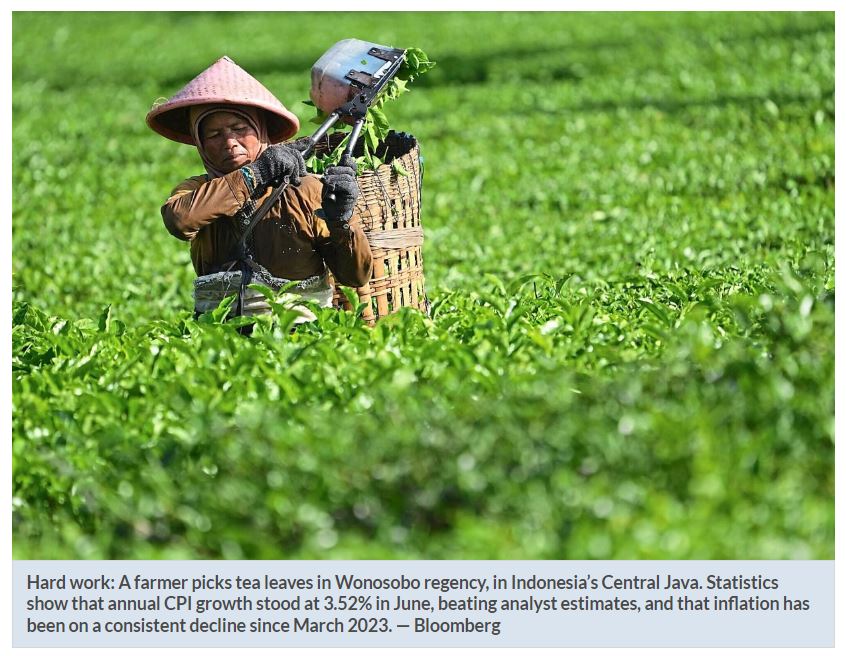Indonesia: BI unlikely to cut rates despite slower inflation
JAKARTA: Inflation dropped more than expected last month, maintaining a trend that began in March, yet experts do not expect Bank Indonesia (BI) to cut its benchmark interest rates this year, as imported inflation remains a risk.
Statistics Indonesia (BPS) revealed on Monday that annual consumer price index (CPI) growth stood at 3.52% in June, beating Moody’s Analytics estimate of 3.8%.
“Annual inflation has seen a consistent decline since March 2023,” BPS official Pudji Ismartini said on Monday.
The latest reading marks a further decline from May, when the inflation rate dropped to exactly 4%, which marks the upper end of BI’s inflation target range of 2 to 4%.
CPI growth remains well above central bank targets in many other countries around the world.
Transportation was the biggest driver of inflation in Indonesia last month, as prices in this expenditure group were up 10.18% year-on-year.
In a month-to-month comparison, CPI rose 0.14% in June, with food, beverages and tobacco alone accounting for 0.1 percentage points as prices in this group rose 0.39% from May.
Core inflation, which has become the de-facto basis for BI’s interest rate policy, eased to 2.58% in June from 2.66% in the preceding month.
Core inflation excludes from the CPI calculation certain food and energy products that tend to have volatile prices.
Despite the faster-than-expected reduction in inflation, experts believe BI will keep key interest rates at their current levels at least until the end of the year, given that some external pressure remains.
Late last month, BI kept its benchmark seven-day reverse repo rate at 5.75%, the level it reached in January after being raised by a cumulative 225 basis points beginning in August last year.
The monetary policy authority said its efforts were currently focused on keeping the rupiah’s exchange rate stable and mitigating potential adverse effects on Indonesia’s economy from global financial markets.
Bank Mandiri economist Faisal Rachman told The Jakarta Post on Monday that external challenges would prompt BI to keep its rates unchanged at least until the end of 2023.
“It is true that there is some room for domestic inflation to decline, but from the external side, there are some challenges, because the world’s major central banks will keep increasing their interest rates,” said Faisal.
That may impact the rupiah’s exchange rate, bringing about imported inflation and narrowing the trade surplus, he explained.
Concurring with that, Bank Danamon economist Irman Faiz told The Post that he did not see BI cutting rates this year.
“We believe that, with the risk of a weakening rupiah exchange rate due to the US Federal Reserve’s (Fed) hawkish stance, BI may keep its policy rate at the current level,” said Irman.
Last month, the Fed announced that it would keep interest rates unchanged after 10 straight hikes but signalled that additional hikes could still occur before the end of this year. — The Jakarta Post/ANN


 Thailand
Thailand




